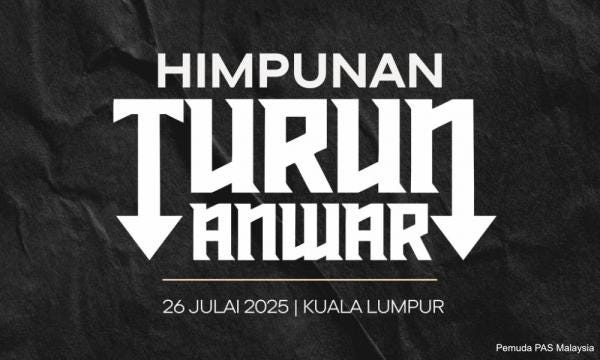
Murray Hunter
Should Malaysians take part in the “Turun Anwar Rally”?
P Ramasamy
Jul 25, 2025

Debate
As the date for the “Turun Anwar Rally” on Saturday, July 26 in Kuala Lumpur approaches, the media landscape is abuzz with opinions, speculations, and warnings. Many Malaysians who value peace and stability have been advised to desist from participating in the rally. Some go further, alleging that since Perikatan Nasional (PN) in general, and PAS in particular, are the masterminds behind the rally, the event may harbour extreme centrifugal tendencies that could destabilise the nation.
Case for Anwar
Supporters of Prime Minister Anwar Ibrahim, though dwindling, argue that he has not even completed a full term in office. They believe he should be given the time and space to implement the reforms he championed during his time in the opposition. These voices argue that had Pakatan Harapan (PH) come to power independently, without forming a coalition with Barisan Nasional (BN) and other regional parties, reforms would have been easier to implement. They also argue that the current unity government presents structural limitations that hinder reform initiatives.
Case against Anwar
On the other hand, detractors of the rally point out that there is no viable alternative to Anwar at this moment. Nonetheless, criticisms persist. Many argue that Anwar was catapulted to power on the back of reformist promises that remain unfulfilled. The judiciary, they say, is in worse shape than before, and Anwar’s claims of non-interference are dismissed as political deflection. His need for legal and constitutional immunity only deepens public scepticism.
Symbolism and strategy
The “Turun Anwar Rally” carries both literal and symbolic weight. Literally, it is a call for Anwar to step down. Symbolically, it marks the first major opposition-led rally since the 2022 general elections, registering deep dissatisfaction with the Madani government’s management of the country. It is not simply opposition for opposition’s sake—the criticisms reflect fundamental concerns about governance, transparency, and the lack of promised reforms.
Ethnic dynamics and realignment
Unlike earlier anti-government demonstrations which were largely Malay-centric, this rally may signal a broader ethnic representation. The involvement of Urimai, MAP, MIPP, and other Indian-based organisations suggests growing frustration within the Indian community. While the Chinese community may appear to be fence-sitters for now, a shift in leadership or political momentum could change their stance in time.
Astrological warnings and public response
In an unusual twist, one viral video specifically called on Hindus to avoid the rally, citing unfavorable planetary alignments. Such arguments may sway some, but many see this as a distraction from the real issues. Celestial concerns, they argue, are for passive recipients of change—not those actively working to bring it about.
Preemptive moves by government
In what many see as a preemptive concession, Anwar has recently announced a series of populist measures aimed at softening public sentiment ahead of the rally. The timing is telling—it doesn’t take a political analyst to draw the connection between the rally and the sudden release of policy “sweeteners.”
A turning point for Malaysia?
The “Turun Anwar Rally” represents more than just political theatre. It is an opportunity for Malaysians of all backgrounds to demand accountability, good governance, and genuine reform. With the Federal Court having removed legal barriers to peaceful assembly, the public now has both the legal and moral ground to express dissatisfaction.
If meaningful change is to occur, it may very well start from gatherings like this. The question remains: is it better to be an active agent of change—or a passive recipient of decisions made by others?
No comments:
Post a Comment